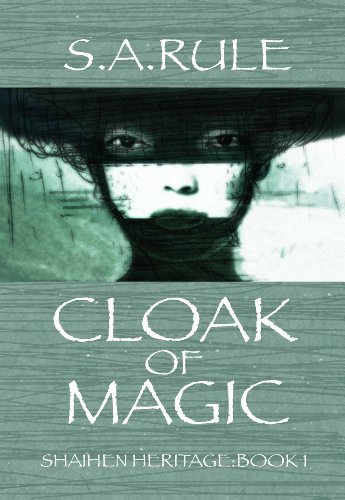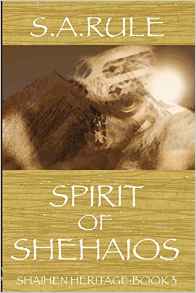
Book Review: The Shaihen Heritage Trilogy (Cloak of Magic/Staff of Power/Spirit of Shehaios) by S.A Rule
I'm reviewing the whole trilogy rather than each book separately because I think I'd end up repeating myself otherwise. I don't usually take the time to write reviews (far too busy reading, although I've joined this site to change that) but I think this series of books, perhaps because the author self published, has slipped under the radar and people need to know how good it is! I'll stay clear of spoilers though.
The first of this trilogy; Cloak of Magic, was published way back in 2006 and the last, Spirit of Shehaios, in 2011 but I think these books are well placed to come into their own in 2016: The storyline captures some of the innocence and magic of Harry Potter, the power plays and licentiousness of Game of Thrones, and the subtle critique of contemporary society found in The Hunger Games, all packaged up in an alternative pre-history with a similar feel to The Hobbit and Lord Of The Rings – what's not to like!
Throwing such successful titles around may seem like hyperbole, but I challenge you to read The Shaihen Heritage Trilogy and not agree.
In Cloak of Magic we're introduced to a Shire-like world of good natured people who live in harmony with the land. It's a balanced society where male and female are equal, inhabiting roles from Chief to Minstrel alike, where both sexes display depths of emotion and strength of will – and where everyone likes a good party. In this world there are dragons and unicorns, there are spirits and magicians, and the people see themselves as expressions of the spirit of the land.
Through the course of the Shaihen Heritage trilogy this world is increasingly threatened by an encroaching empire within which, things are done very differently. A patriarchal power structure, where women are adornments or deceivers, men are stubborn and ambitious, cities are decadent places of plenty – surrounded by slums and fuelled by servitude – and everyone knows their place. In this world there is war and slavery, there are prostitutes and priests, and the people see the land as something to own and fight over (sound familiar anyone?).
The tension created by this clash of cultures invites a delightfully subtle criticism of our own modern world in much the same way that the exaggerated spectacle of The Capitol does in The Hunger Games. Unlike The Hunger Games though, this trilogy doesn't follow just one main protagonist. The first two books are led largely by the mercurial character of Kierce, the Shaihen magician, but he is by no means the only lead. There are Chiefs and Healers, Warriors and Scholars, parents, children, Kings and Emperors as well as gamblers and tavern owners. What impresses me most about this series, in fact, is the sheer depth and richness of all the characters we encounter. With the possible exception of the priest, Aruath, in the third book, none of the players we meet can be accused of being shallow or two-dimensional; they all possess a subtle, textured personality and a rich, individually nuanced inner world, which makes them feel so much more real than mere words on a page.
This realness is what draws you in and what makes the books so easy to read: where Lord Of The Rings can get bogged down in lengthy descriptions of the landscape, in Shehaios you find yourself identifying with characters on all sides of the dice, be they noblemen, slaves, farmers or soldiers; none are defined simply by their role – even Kierce is far more human than Tolkien's Gandalf or Rowling's Dumbledore.
The three books span a large time frame, with the third story, Spirit of Shehaios, occurring at a further remove from the first two, and this makes the final instalment a little harder to get into. The reader is caught on the back foot, so to speak, and feeling like there's a lot to catch up on and a lot of new characters in whom we're not particularly invested. In fact, you could stop reading at the end of the second book, Staff Of Power, and still be blown away. But with a little patience, the realness of the characters – some of whom are familiar – and their capacity to surprise us, once again pulls you back in.
I read most of this trilogy while travelling on trains and there were times when I could not help but laugh out loud as well as times where I found my self welling up in tears or struggling to contain the tension – all rather embarrassing, for a grown man in a public place, and not usually something I have to contend with. In almost all cases, it's the interplay between the characters (all of whom you really come to care for), which leads to this powerful emotional journey. There is, however, plenty of action and a fair share of plot twists to contend with. In particular, I was impressed by the candid descriptions of sex acts. The books are not saturated with them but, when they happen, the author manages to find the right balance between descriptive and erotic, never straying into graphic gratuitousness nor sentimentality.
Coming from an unknown, unsung author, this power house of creative imagination, action, adventure and subtle social critique is simply astounding. And knowing that I'm one of the first to discover this series made the whole experience feel a little more special. So my advice to you would be, 'don't delay!' read this trilogy now so you can say you loved Rule when she was still underground (and not in the way that Tolkien is under ground – by then you'll be late too the show!).



